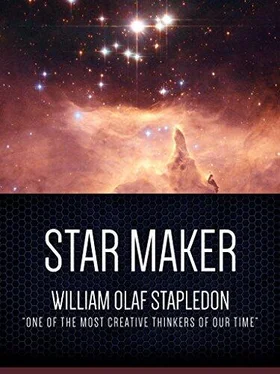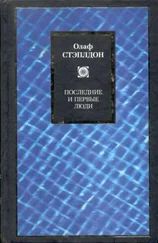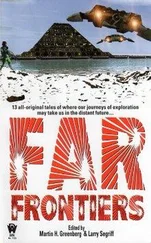Science and industry had brought one of those sudden and extreme revolutions of thought which were so characteristic of the Other Men. Nearly all the churches were destroyed or turned into temporary factories or industrial museums. Atheism, lately persecuted, became fashionable. All the best minds turned agnostic. More recently, however, apparently in horror at the effects of a materialistic culture which was far more cynical and blatant than our own, the most industrialized peoples began to turn once more to religion. A spiritistic foundation was provided for natural science. The old churches were re-sanctified, and so many new religious edifices were built that they were soon as plentiful as cinema houses with us. Indeed, the new churches gradually absorbed the cinema, and provided non-stop picture shows in which sensual orgies and ecclesiastical propaganda were skilfully blended.
At the time of my visit the churches had regained all their lost power. Radio had indeed at one time competed with them, but was successfully absorbed. They still refused to broadcast the immaculate union, which gained fresh prestige from the popular belief that it was too spiritual to be transmitted on the ether. The more advanced clerics, however, had agreed that if ever the universal system of "radio-bliss" was established, this difficulty might be overcome. Communism, meanwhile, still maintained its irreligious convention; but in the two great Communist countries the officially organized "irreligion" was becoming a religion in all but name. It had its institutions, its priesthood, its ritual, its morality, its system of absolution, its metaphysical doctrines, which, though devoutly materialistic, were none the less superstitious. And the flavor of deity had been displaced by the flavor of the proletariat.
Religion, then, was a very real force in the life of all these peoples. But there was something puzzling about their devout-ness. In a sense it was sincere, and even beneficial; for in very small personal temptations and very obvious and stereotyped moral choices, the Other Men were far more conscientious than my own kind. But I discovered that the typical modern Other Man was conscientious only in conventional situations, and that in genuine moral sensibility he was strangely lacking. Thus, though practical generosity and superficial comradeship were more usual than with us, the most diabolic mental persecution was perpetrated with a clear conscience. The more sensitive had always to be on their guard. The deeper kinds of intimacy and mutual reliance were precarious and rare. In this passionately social world, loneliness dogged the spirit. People were constantly "getting together," but they never really got there. Everyone was terrified of being alone with himself; yet in company, in spite of the universal assumption of comradeship, these strange beings remained as remote from one another as the stars. For everyone searched his neighbor's eyes for the image of himself, and never saw anything else. Or if he did, he was outraged and terrified.
Another perplexing fact about the religious life of the Other Men at the time of my visit was this. Though all were devout, and blasphemy was regarded with horror, the general attitude to the deity was one of blasphemous commercialism. Men assumed that the flavor of deity could be bought for all eternity with money or with ritual. Further, the God whom they worshipped with the superb and heart-searching language of an earlier age was now conceived either as a just but jealous employer or as an indulgent parent, or else as sheer physical energy. The crowning vulgarity was the conviction that in no earlier age had religion been so widespread and so enlightened. It was almost universally agreed that the profound teachings of the prophetic era were only now being understood in the sense in which they had originally been intended by the prophets themselves. Contemporary writers and broadcasters claimed to be re-interpreting the scriptures to suit the enlightened religious needs of an age which called itself the Age of Scientific Religion. Now behind all the complacency which characterized the civilization of the Other Men before the outbreak of the war I had often detected a vague restlessness and anxiety. Of course for the most part people went about their affairs with the same absorbed and self-satisfied interest as on my own planet. They were far too busy making a living, marrying, rearing families, trying to get the better of one another, to spare time for conscious doubt about the aim of life. Yet they had often the air of one who has forgotten some very important thing and is racking his brains to recover it, or of an aging preacher who uses the old stirring phrases without clear apprehension of their significance. Increasingly I suspected that this race, in spite of all its triumphs, was now living on the great ideas of its past, mouthing concepts that it no longer had the sensibility to understand, paying verbal homage to ideals which it could no longer sincerely will, and behaving within a system of institutions many of which could only be worked successfully by minds of a slightly finer temper. These institutions, I suspected, must have been created by a race endowed not only with much greater intelligence, but with a much stronger and more comprehensive capacity for community than was now possible on the Other Earth. They seemed to be based on the assumption that men were on the whole kindly, reasonable and self-disciplined.
I had often questioned Bvalltu on this subject, but he had always turned my question aside. It will be remembered that, though I had access to all his thoughts so long as he did not positively wish to withhold them, he could always, if he made a special effort, think privately. I had long suspected that he was keeping something from me, when at last he told me the strange and tragic facts.
It was a few days after the bombardment of the metropolis of his country. Through Bvalltu's eyes and the goggles of his gas-mask I saw the results of that bombardment. We had missed the horror itself, but had attempted to return to the city to play some part in the rescue work. Little could be done. So great was the heat still radiated from the city's incandescent heart, that we could not penetrate beyond the first suburb. Even there, the streets were obliterated, choked with fallen buildings. Human bodies, crushed and charred, projected here and there from masses of tumbled masonry. Most of the population was hidden under the ruins. In the open spaces many lay gassed. Salvage parties impotently wandered. Between the smoke-clouds the Other Sun occasionally appeared, and even a daytime star.
After clambering among the ruins for some time, seeking Vainly to give help, Bvalltu sat down. The devastation round about us seemed to "loosen his tongue," if I may use such a phrase to express a sudden frankness in his thinking toward myself. I had said something to the effect that a future age would look back on all this madness and destruction with amazement. He sighed through his gas-mask, and said, "My unhappy race has probably now doomed itself irrevocably." I expostulated; for though ours was about the fortieth city to be destroyed, there would surely some day be a recovery, and the race would at last pass through this crisis and go forward from strength to strength. Bvalltu then told me of the strange matters which, he said, he had often intended to tell me, but somehow he had always shunned doing so. Though many scientists and students of the contemporary world-society had now some vague suspicion of the truth, it was clearly known only to himself and a few others.
The species, he said, was apparently subject to strange and long-drawn-out fluctuations of nature, fluctuations which lasted for some twenty thousand years. All races in all climates seemed to manifest this vast rhythm of the spirit, and to suffer it simultaneously. Its cause was unknown. Though it seemed to be due to an influence affecting the whole planet at once, perhaps it actually radiated from a single starting point, but spread rapidly into all lands. Very recently an advanced scientist had suggested that it might be due to variations in the intensity of "cosmic rays." Geological evidence had established that such a fluctuation of cosmical radiation did occur, caused perhaps by variations in a neighboring cluster of young stars. It was still doubtful whether the psychological rhythm and the astronomical rhythm coincided, but many facts pointed to the conclusion that when the rays were more violent the human spirit declined.
Читать дальше









![Олаф Стэплдон - Создатель звезд [сборник litres]](/books/433148/olaf-stepldon-sozdatel-zvezd-sbornik-litres-thumb.webp)


